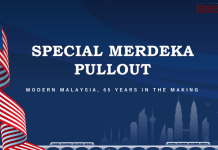By Sharon Chang
Malaysia is a great partner for Germany to do business and investments, says German Ambassador to Malaysia H.E. Nikolaus Graf Lambsdorff, in an interview with Business Today.
Germany is Malaysia’s largest European trading partner in 2019. Trade and business have traditionally dominated German-Malaysian bilateral relations, with the two-way trade amounted to EUR14.26 billion (RM68.4 billion) in 2019, up 18.1 percent from EUR12.07 billion (RM57.85 billion) in 2018.
In 2019, Malaysia’s exports to Germany is EUR8.69 billion (RM41.7 billion), while the imports from Germany is EUR5.57 billion (RM26.7 billion). Currently, with around 400 German companies operating in Malaysia, Germany has a considerable presence in the country.
During the interview, H.E. Nikolaus Graf shares his thoughts on Germany’s strategy towards the fight against Covid-19 and talks on both the countries’ bilateral ties.
Germany has a very aggressive strategy on Covid-19 economic survival, and it seems to be working very well. Could you elaborate what Germany is doing and what are the lessons other countries can learn from it?
Each situation is slightly different but what we noticed is that the fight against covid-19 seems to be a fight by the nation states and not so much by international organisations which from our point of view is a pity because we believe in multi-nationalism, the United States system and of course the World Health Organisation.
But, in the European Union (EU), even each member state must find their own way. Germany is in a better position over other countries, because our overall national debt is relatively low. The catchword in Germany is “Schwarze Null” (Black Zero) which means the finance minister should not spend more than what the country has.
As Germany has been saving and gaining from good economic growth, we have more financial leeway than most other countries. The German economy is the biggest and strongest in Europe. From the onset of the Covid-19, our government has disbursed financial aid quickly through a well function public administration especially to smaller companies who can need funds to retain their workers.
Retaining employees is very important in any organisation something which we learnt from earlier crisis. It is much cheaper to subsidise wages for a while than retrenching and rehire them once the economy is back on track.
It does involve a large financial contribution from the government to keep companies alive. To date, Germany has already spent 60 percent of its Gross Domestic Product (GDP). The methods and policies in Germany seem to be working well but whether Germany’s strategy model is a way for others to adopt can be discussed.
During the Movement Control Order (MCO), what have been the concerns of German companies operating here in Malaysia?
German companies are by far the biggest European investors in Malaysia. They invested mostly in manufacturing but started in semi-conductors in Penang and have been here for decades.
During the MCO, they were very worried to see that their staff cannot go to work, and they had to get permission from the Ministry of International Trade and Industry (MITI), to produce and manufacture. In the beginning there were several issues and challenges with MITI, it is understandable as they were overwhelmed. Surprisingly, they find it difficult to understand how important and complicated supply chains works. Giving permission to only one company to operate is not enough because the company also depends on many other companies down and up its supply chain.
This was the number one issue, but in the end MITI did a good job. But it took a while. For weeks now, practically all the companies have started producing.
During the MCO, B. Braun, a leading global medical technology company, established in 1972 in Penang, continued its production but could only utilise 50 percent of their staff to produce 90 percent output. It was so strenuous and not easy for the workers. But now, they are exporting which is good for them and the Malaysian economy in general.
They were determined to save lives and ensure an uninterrupted flow of medical supplies to all the health care sectors in Malaysia and around the world.
The other issue is freight rates, as worldwide prices are going through the roof because of limited flights.
Germany has a considerable economic presence in Malaysia, with many big-size German companies established here. What are the sectors which have strong and distinguished presence?
Yes, the economic relations between both countries have always been strong. We have several hundred companies here but most of them are in manufacturing and generated thousands of jobs. The top five are Infineon Technologies, B. Braun Medical Industries, Osram Opto Semiconductor, Robert Bosch and Elektrisola. They produce here and export back to either Germany or globally, which has been going on for decades.
The Malaysian government has publicly said they are “business friendly” and hence Malaysia is a good place to invest.
German companies have continuously moved up the value chain and have learnt to produce high-tech products here in Malaysia which are 100 percent competitive in the world market, not because of cheap labour but the overall investment climate.
The focus is still on manufacturing which reflects on the Germany economy agenda. We still have a much larger manufacturing sector than the UK which is why we always want to protect this sector in Malaysia.
What can Malaysia do further for existing German companies here so they can remain and reinvest?
The situation is changing so much, no one knows what the new normal will look like and it will be tough.
However, there are two things that comes to mind. Firstly, keep it open, allow companies to import and export when they need to which has always been the case. Why change that?
Secondly, Malaysia needs foreign investment more than ever now. They are being hit by a double or triple whammy such as low oil prices, Covid-19, and failing world markets for Malaysian products and the palm oil issue of course. It is very challenging for Malaysia, hence foreign direct investment (FDI) in general is important.
German companies are here to stay and reinvest. They might be more prudent with their investment plans but no basic changes for now or post-Covid-19.
There are some new companies which want to invest in Malaysia but there is a challenge right now, foreigners cannot enter Malaysia. If you do not allow foreigners in, there will be a hard time finding investors later.
For example, there is a German company up in Kulim which needs 70-80 experts to come over from Germany on a rotating system to implement a big investment, but it is now on hold because they cannot come. Hopefully, the government can be more flexible.
What about new emerging sectors expanding their footprint into Malaysia?
Yes, Kuala Lumpur has become more attractive to the service sectors because of lower cost. There are companies which relocated their headquarters from Hong Kong, Singapore and even Germany to Kuala Lumpur. This is a trend which will continue provided Malaysia can offer the right conditions.
One of course is the relatively low rent and the second one is digitisation. Foreign investors tell me there is always room for improvement. There are new sectors which have little to do with manufacturing in the traditional way but offer services.
There was a successful story on Rocket Internet, a German startup then, which started Zalora and Lazada in Malaysia but later sold to Alibaba. Will other German startups see Malaysia as an opportunity too?
I believe so but however there are competitions. There are others in the region like Vietnam which is attracting a lot of investments from Germany. Hence, Malaysia must keep up with others and point out its strength and experience the Malaysian economy has to offer. You need good governance, less bureaucracy which is quite a challenge to the Malaysian system, politics as well as public administration.
The interest is there but Malaysia needs to sell what she has, sad to say it is not Malaysia’s strength.
German companies are moving out of China and looking to diversify their supply chains, is Malaysia on their roadmap?
Geographically Malaysia is much closer to China. Some companies have realised that they do not necessarily need to be physically in China to benefit from the enormous Chinese market. They can set up in other countries like Malaysia for example, to export to China.
Quite a few German investors attracted other investors to Malaysia because they need them. The German brands which have assembly facilities here are Mercedes-Benz, BMW, and Volkswagen. The two premium brands between them produce around 10,000 cars in Malaysia, for export to the ASEAN market, hence, they need suppliers and they have attracted German suppliers to follow them. This is one model worth looking at for Malaysia.
How can Malaysia position itself as the springboard for Germany’s market expansion into ASEAN?
Of course, and lately, several German companies have moved out of Singapore to Johor. The main reason is space. Any company that needs space and labour will find it difficult in Singapore. Singapore cannot compete in that area and they know it.
One example is Volkswagen where they moved all their spare parts business for Southeast Asia to the Port of Tanjung Pelepas, which currently employs 15,000 people.
Do you see any developments in the higher education and institutions offering German language courses and student exchange both in Malaysia and in Germany?
The number of Malaysian students going to Germany for education has been increasing and so are the number of young Malaysians here wanting to learn the German language at Goethe-Institute Malaysia.
In addition, German is taught in fifty secondary schools here as well as two state universities. Furthermore, we have been investing in vocational training and expanding the cooperation agreements between German and Malaysian universities to enhance student exchanges.
Germany’s tourism numbers to Malaysia is relatively small. How can we improve to attract more German tourists?
Malaysia should be able to attract more tourists, and not just Germans because it has environmentally rich surroundings, and it is safe and stable.
The country should in fact be among the main tourism stop for Europeans with the right strategy and promotions. It is true that Malaysia is not wellknown in continental Europe because it has not done enough to sell and promote itself.
When it comes to attracting tourists, it helps if you have something special to offer. This is to help people identify Malaysia with something possibly you cannot find anywhere else.
Now with Brexit, will Malaysia’s trade be impacted since the UK has been a gateway for Malaysia into the EU?
It is understandable that Malaysia is more attached to the UK, but I doubt there will be issues. I would expect more trade from Malaysia going into continental Europe directly. It is not necessary to use UK as a gateway anymore.
Lastly, how would you summarise the current state of the diplomatic relations between our two countries? And what can be done to further enhance the relations?
Firstly, there are no bilateral political issues. But to enhance the relations, we need continuous attention.
I would like to see more bilateral visits and foster closer ties in all spheres with Germany and more understanding on the economic situation of Malaysia.
protective equipment (PPE) to the Penang State Fire & Rescue Department to safeguard Malaysia’s
frontliners as they go about their duties to sanitize and disinfect public areas in Penang
police stations in Kulim and Melaka to show how much the
sacrifices made by Malaysia’s frontline staff are appreciated











